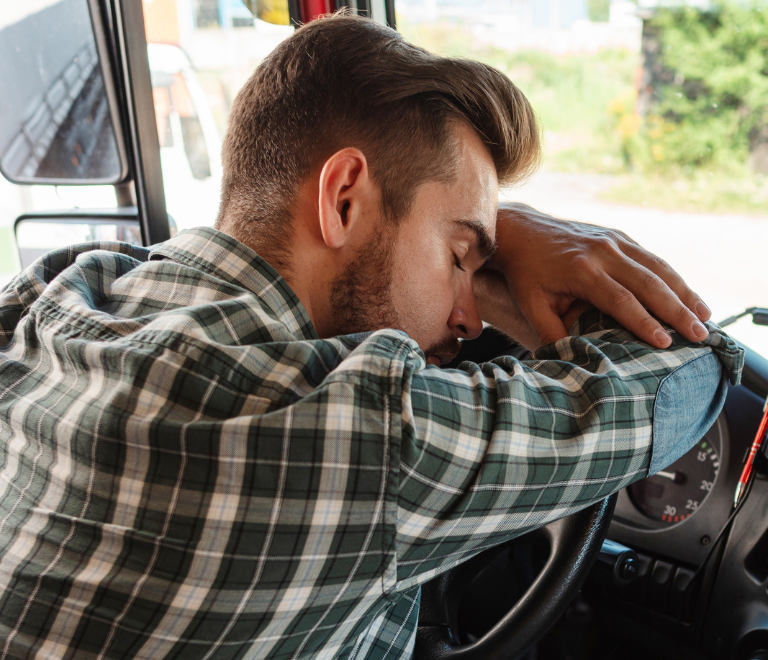When performance is hampered by physical or mental strain, fatigue sets in. Several causes, including insufficient sleep, extended work hours, demanding work or non-work activities, or a mix of these, can lead to driver tiredness. One-third of commercial motor vehicle (CMV) drivers were believed to be exhausted at the time of their crash, according to the Large Truck Crash Causation Study (LTCCS).
That’s why when you feel too exhausted or sick to drive, you probably are. DOT suggests that you stop driving as soon as you start to feel tired, ill, or impaired.
Here is everything you need to know about fatigue driving regulations for truck drivers and tips to avoid fatigue.
FMCSA Regulation 392.3: Ill Or Fatigued Operator
It is against the law for a driver to operate a commercial motor vehicle while their ability or alertness are compromised, or are likely to be compromised due to illness, fatigue, or any other reason that would make driving or operating the commercial motor vehicle unsafe. This also applies to motor carriers.
The driver may, however, proceed to operate the commercial motor vehicle to the closest location where the hazard is eliminated in the event of a serious emergency if adhering to this section would raise the risk to the vehicle’s occupants or other highway users.
Tips To Stay Healthy And Well Rested During Long Trips
Get Enough Rest Before Operating a Vehicle
When not driving, make sure that you get enough sleep every night. When your body is naturally sleepy, which is between the hours of 12 a.m. and 3 a.m., try not to drive. until six in the morning. and 2:00 p.m. until 4 p.m. Driver fatigue can make it more difficult for a driver to react quickly to possible risks, which raises the risk of being involved in an accident. If you do experience fatigue while driving, make sure to find a safe spot to stop and rest.
FYI: The wake/sleep cycle that our bodies go through every day and night is referred to as the circadian rhythm. The cycle affects our internal clock and regulates the body’s regular pattern of attentiveness throughout the day. When a driver doesn’t get enough sleep, their natural “lulls” of tiredness might become even more intense, which can negatively impact their driving abilities and attentiveness.
FYI: Accidents are most likely to happen during the first hour of driving, according to a recent study that looked at the probability of a safety-critical occurrence as a function of driving hour. The authors hypothesize that drivers may be affected by sleep inertia shortly after waking up. This might apply especially to drivers who use the sleeper berth for sleeping. The deterioration of cognitive functioning, short-term memory, alertness, reaction time, and the capacity to avoid falling asleep in a variety of performance assessments is referred to as sleep inertia.
Keep A Balanced Diet
Fatigue and/or food cravings might result from skipping meals or eating at strange times. Additionally, sleeping on an empty stomach or right after a large meal can disrupt your sleep.53 Having a small snack before bed may improve your quality of sleep. Recall that sleep deprivation can lead to induced weariness, which can result in impaired judgment, diminished attention, memory loss, lack of awareness, and sluggish reaction times.
FYI: An unhealthy lifestyle, long work hours, and sleep issues were shown to be the primary causes of drivers nodding off while operating a commercial motor vehicle (CMV) in a recent study on the sleeping and driving habits of CMV drivers.

Take A Nap
If you find yourself feeling sleepy or less attentive, try to get some rest. A nap should ideally last up to 45 minutes, but it should at least last 10 minutes. After waking, give yourself at least fifteen minutes to recuperate before getting behind the wheel.
FYI: Taking a 10-30 minute nap is more powerful than coffee.
FYI: When it comes to preserving a driver’s performance, naps done to avoid tiredness are usually more beneficial than naps taken once drowsy.
Stay Away From Medication That Could Make You Sleepy
If you intend to drive, stay away from drugs that might make you sleepy. The majority of drowsiness-inducing drugs come with a warning label saying that you shouldn’t operate machines or cars while taking them. Medications that commonly cause drowsiness include tranquilizers, sleeping drugs, allergy medications, and cold remedies.
FYI: According to a recent survey, at the time of an accident, 17% of CMV drivers acknowledged using “over-the-counter drugs.”
FYI: One of the most popular medications that might cause drowsiness is cold tablets. If you must drive while sick, it is safer to be sick than to drive while taking medication.
Understand The Warning Signs And Risks Of Sleepiness
Be aware that drowsiness can be indicated by heavy eyes, frequent yawning, and blurred vision.
FYI: According to research, staying up for eighteen hours is equivalent to having a blood alcohol content (BAC) of 0.08 percent, which puts you at the same legal risk of intoxication and a crash.
FYI: According to a 2005 survey, three out of every four CMV drivers claim to have made at least one form of drowsiness-related driving error.
FYI: A 23-year-old CMV driver fell asleep at the wheel on October 16, 2005, around 2 a.m., which resulted in him going into a ditch and finally rolling his truck over on both westbound lanes of Interstate 94. A school band on a charter bus collided with the truck a few minutes later, leaving five people dead and 29 injured. Following the event, the CMV driver was charged with twenty-nine counts of reckless driving inflicting severe bodily harm and five charges of homicide by negligent operation of a vehicle. If proven guilty, he could have been sentenced to nearly 90 years in prison.
Avoid Being Dependent On “Alertness Tricks”
A false sense of security may be created by engaging in activities like smoking, listening to loud music, drinking coffee, opening windows, and other “alertness tricks” that are not effective treatments for sleepiness.
FYI: Excessive intake of caffeine can lead to insomnia, headaches, anxiety, and agitation.
FYI: Caffeine may not take action as quickly as you might think if you are already fatigued when you first drink a caffeinated drink since it takes several minutes for the caffeine to enter your system and provide the necessary energy boost. Furthermore, the effect can be significantly less if you consume caffeine frequently.
FYI: Although you might feel more aware for a brief while if you roll down the window or crank up the radio, these are ineffective strategies for staying at a suitable level of alertness.
Learn more tips like this by visiting our website.



